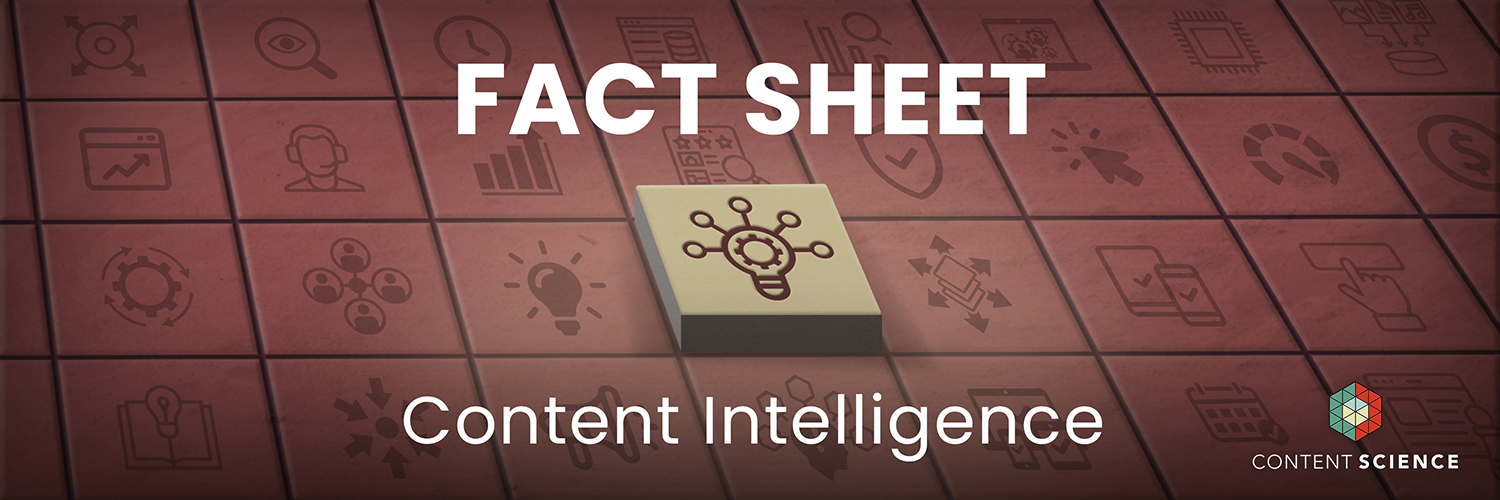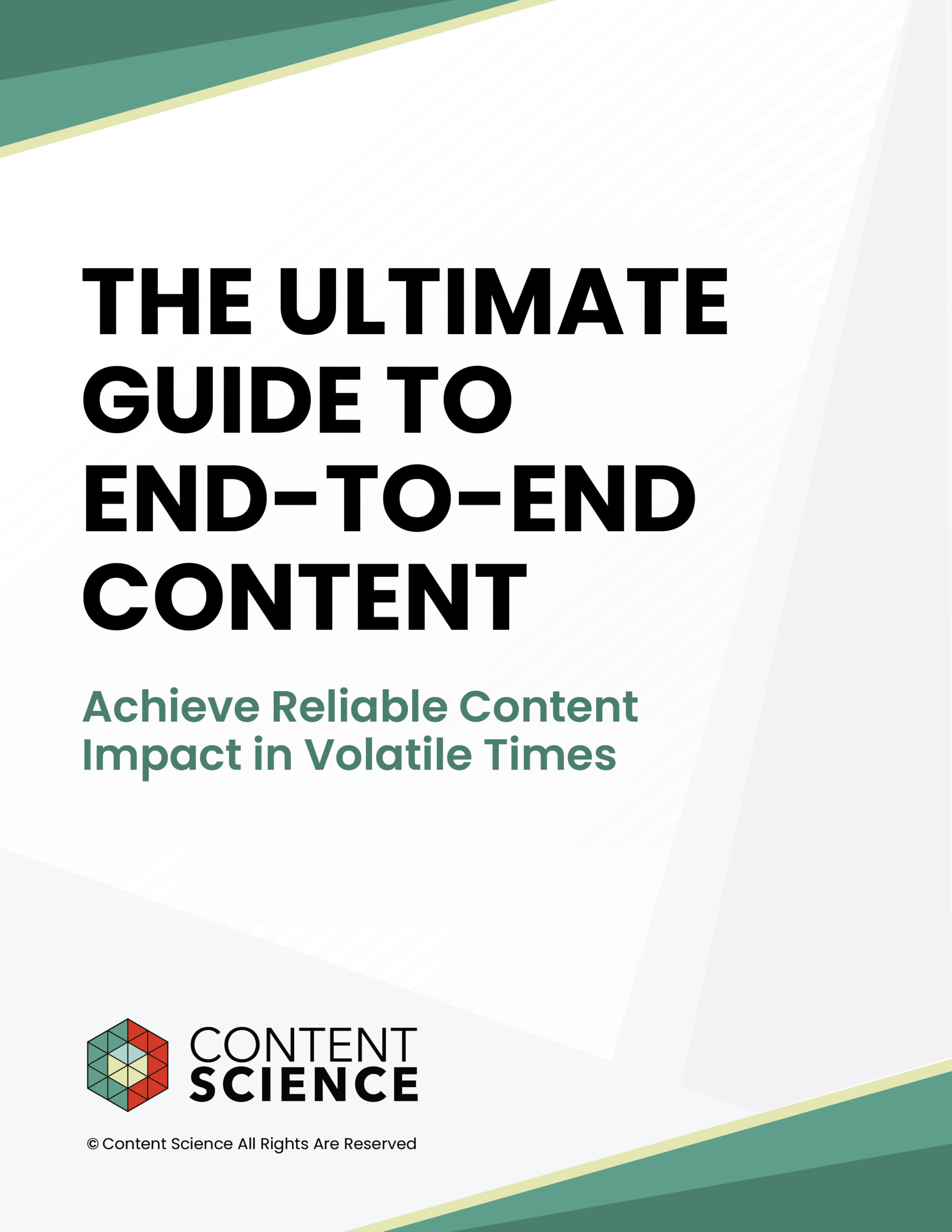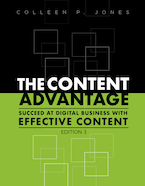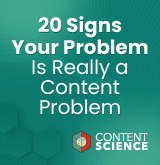
What is content intelligence? We define content intelligence as representing the systems and software that transform content data and business data into actionable insights for content strategy and tactics with impact.
The key phrase: Actionable insights. Why? Because it encapsulates the most important aspects of content intelligence: people and analysis. Without these two elements, organizations cannot move beyond content analytics to content intelligence.
The content intelligence approach consists of three main elements:
- Gather content data from multiple sources
- Analyze and interpret the data
- Develop insight and take action

According to the semantic AI platform company Smartlogic, no matter how powerful, computers aren’t capable of deriving meaningful information from unstructured data, and the diversity, volume and velocity at which it’s flowing into businesses makes it difficult for individuals to manage, so they don’t. As a result, the vast majority of human intelligence isn’t used in decision-making processes. Content intelligence—the combination of semantic technology and information science—is the solution to this problem.
Content Intelligence Trends
Organizations are still in the midst of trying to get a handle on the mountains of data they have available to them.
The data dilemma: Unstructured data accounts for 80% of all data. — IBM
Still an emerging area: As Content Science founder Colleen Jones predicted in back in 2016, “Content intelligence will emerge as a strategic practice.” Although people have been talking about—or around—content intelligence since 2007 when Gerry Brown of Bloor Research used the term “content intelligence” “to describe what he saw as a union between standard structured data analysis and the mining of unstructured data.” Yet, nearly 10 years later it’s still not a widely adopted practice in part because of data overwhelm, poor leadership, or lack of dedicated resources. — Colleen Jones, Content Science
From “big data” to content intelligence: After years of predictions and promises, we are starting to see a more widespread adoption of content analytics within a variety of publishing and marketing environments—but they are usually not called by the term “content analytics” or “text analytics.” Sometimes, they are denoted by the ubiquitous “Big Data“ label or even “artificial intelligence.” So, on one hand, content analytics as a distinct industry is not growing fast—but only because the vision is being realized outside of that label. — Andrew Davies, Founder of content intelligence company Idio, now part of Episerver
Companies are investing in content intelligence: Respondents to an IDC survey said their average expected increase in spending for content intelligence technologies over the next year will be 31%. — Content Intelligence and the Future of Work, IDC
Uses and Benefits
Content intelligence can help your organization make better decisions, faster than ever before.
Stops silos: Gerry Brown of U.K.’s Bloor Research explains that “content intelligence provides a complete 360-degree view of the previously separated silos of enterprise data and text. It provides the ability to slice and dice, drill down and report on text and data as an integrated whole.” — Gerry Brown, Bloor Research
Informs plans: Content intelligence informs both strategic priorities and tactical decisions for impact. — Content Intelligence: A Case Study at the American Cancer Society in Applied Marketing Analytics
Provides employee insights: Content intelligence can also be applied to employee advocacy and accountability. As bigtincan CEO says, “By mapping out how an individual employee utilizes information—what content he or she accesses; how often, when and where certain materials make the biggest impact and what is most frequently shared and collaborated upon with their colleagues—companies can build a history of actions to benchmark performance. If an employee begins to access or share content less, this could be an indication that the user is unsatisfied or unmotivated in their job, or simply that the content available is no longer as effective as it once was.” — David Keane, CEO, Bigtincan
Enables smart content: Smart content is decision-ready global market intelligence shared across the enterprise at the speed of business to drive strategic and operational business decisions. — David Geddes, Geddes Analytics
Makes future content analysis and auditing easier: Often, companies wait until a redesign or until a replatforming or a digital transformation initiative becomes priority before they analyze their content. Because content analysis has not happened in years, it’s a big, expensive, slow job. Investing in ongoing content intelligence enables organizations to avoid this problem and handle analysis for the next big challenge more efficiently. — The Content Advantage
Challenges and Solutions
Sometimes the hardest part of content intelligence is centered around the people involved. Selecting top tools is also essential.
Overcoming inertia: Acting on the content intelligence is key. We rely on a number of data points, tools, analytics, and numbers, and it’s easy to be rendered impotent with all the data and do nothing. But just act on it. — Q&A With American Cancer Society, Content Science Review
Managing stakeholder expectations: Manage the expectations of your boss and stakeholders by emphasizing the cumulative effect of quality content decisions. Never guarantee overnight results. With many content efforts, including content intelligence, it will take at least a year to start seeing winning outcomes. — The Content Advantage
Choosing the best tools: Consider taking advantage of the following tools if your company already has them, or add them to your tool kit if not.
- Sample web and content analytics tools: Adobe Analytics, Google Analytics, ContentWRX, NewsCred, Percolate, Kapost, Contently
- Sample social and media analytics and sentiment tools: Hootsuite, Mention, Zoho Social, Falcon.io, Meltwater, Cision
- Sample voice of customer tools: ContentWRX, Foresee, Qualtrics, Medallia
— Content Technology: An In-Depth Guide, Content Science Review (Premium)
Bottom Line
Content marketing expert and researcher Steve Rayson warns that if you are not leveraging content intelligence in your content marketing you risk losing out to those that are. This is true for any content operations.
Although it can take time to get started with content intelligence, once you’re collecting the right data and you have a system for analysis in place, developing insights that inform content decisions comes easily. You can better understand your content’s effectiveness, estimate your return on content investment, and more.
Ready to get going with content intelligence? Access our Content Intelligence Readiness Assessment to see if your organization has what it needs to start and be successful.
Events, Resources, + More
The Ultimate Guide to End-to-End Content
Discover why + how an end-to-end approach is critical in the age of AI with this comprehensive white paper.
The Content Advantage Book
The much-anticipated third edition of the highly rated book by Colleen Jones is available at book retailers worldwide. Learn more!
20 Signs of a Content Problem in a High-Stakes Initiative
Use this white paper to diagnose the problem so you can achieve the right solution faster.
Upskill with Content Science Academy
Training for modern content roles through on-demand certifications + courses or live workshops.







Comments
We invite you to share your perspective in a constructive way. To comment, please sign in or register. Our moderating team will review all comments and may edit them for clarity. Our team also may delete comments that are off-topic or disrespectful. All postings become the property of
Content Science Review.